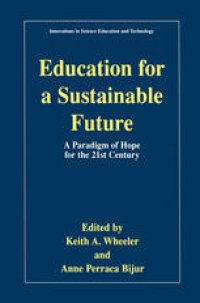
Ebook: Education for a Sustainable Future: A Paradigm of Hope for the 21st Century
- Tags: Science Education, Educational Technology, Sociology of Education, Philosophy of Education
- Series: Innovations in Science Education and Technology 7
- Year: 2000
- Publisher: Springer US
- Edition: 1
- Language: English
- pdf
WHY EDUCATE FOR SUSTAINABILlTY? Ask most people-especially young people-what the future looks like to them. They will paint for you a rosy picture of their individual lives, their future homes, their careers and sometimes even the lives of their children. Then they will paint for you a depleted, conflicted and weary picture of the planet as a whole. Do any of us note the incongruence? We are becoming increasingly aware that the very things we need, the things we adore most in this world are the very things we are undermining through our individual and collective behaviors. We can feel the disconnect between the conse quences of our actions and our values, but we do not necessarily understand it or know how to reconcile it. Living with behavior that feels, and in fact is, inconsistent with our values is a recipe for anguish. We have disconnected so drastically from our sense of place that ironically we poison our water, our air, and our food while at the same time we work hard to secure a healthy and meaningful future for ourselves and our children. This just doesn't make sense.
This book illustrates how sustainability, information technologies, and envisioning the future can be effectively woven into an integrated educational experience. By understanding what it takes to build a sustainable community, students will develop the skills needed to engage successfully in a sustainable society. They will explore their own values, the values of the community and the values of society at large. Students will build awareness of the choices they make and determine whether or not these choices will support their future. Using the real world as their classroom, students will participate in gathering and analyzing data, clarifying values, listening, speaking, thinking creatively, and making decisions about their community.